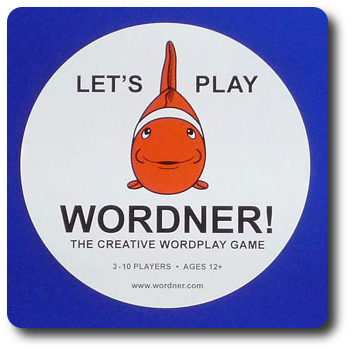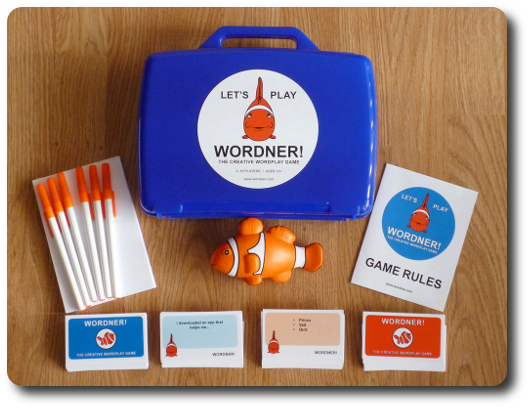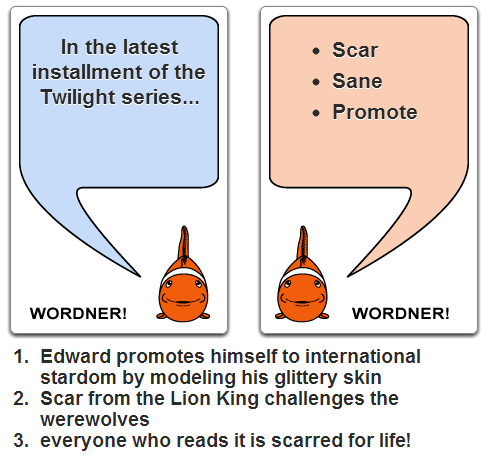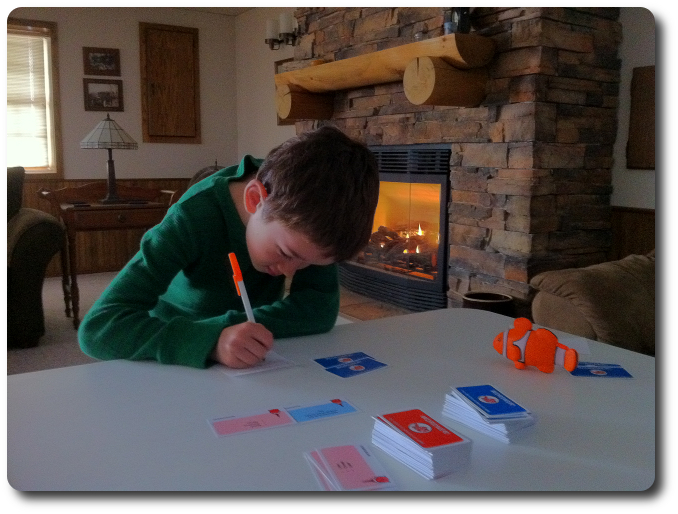
The Basics:
- For ages 8 and up (publisher suggests 12+)
- For 3 to 10 players
- Variable game length
Geek Skills:
- Active Listening & Communication
- Counting & Math
- Logical & Critical Decision Making
- Reading & Writing
- Imagination
Learning Curve:
- Child – Easy
- Adult – Easy
Theme & Narrative:
- None
Endorsements:
- Gamer Geek approved!
- Parent Geek approved!
- Child Geek approved!
Overview
Have you ever tried to finish another person’s sentence for them? For example, I might say, “Boy, am I hungry! Let’s go get some-” and then you interrupt by blurting out, “FISH TACOS!” In this example, you’d be correct. I love me some fish tacos, but most of the time the phrasing that is forcefully injected into another person’s incomplete thought is seldom accurate. This often has hilarious consequences for all within earshot.
Wordner, a self-published game by Andrew Hagenbuch, is comprised of 108 Prompt cards, 108 Starter cards, 6 pens, 1 pad of paper, and 1 Wilbur D. Clownfish (used as a player role identifier). The contents of the game come in a solid plastic box with a handle that makes it easy to store and to travel with. The card quality is typical of playing cards, the pens are all ballpoint tipped (with caps), and Wilbur is a palm-sized foam clownfish. It is, by far, the strangest collection of game bits I have yet come across. Unique and excellent quality from start to finish.

Game Set Up
To set up the game, first separate the Starter and the Prompt cards into two different decks. The Starter cards have a red back and the Prompt cards have a blue back making this an easy exercise. Shuffle both decks and place them face-down in the middle of the playing area.
Second, pass a pen and a piece of paper to each player.
Third, determine who will be the first “judge” and pass them Wilbur.
That’s it for game set up. Let’s play the game!
Wordplay
Wordner is played in turns with no set number of rounds. During each turn, one player will be selected as “judge”. A typical game turn is as follows.
Step 1: Determine Judge
During this step, a player will be selected as “judge”. The new judge for every turn is the player who sits to the left of the previous judge. The judge collects Wilbur and places the clownfish in front of them. Wilbur doesn’t have any other role to play in the game other than being an object of attention and distraction.
Step 2: Draw and Read Cards
During this step, the judge draws the top Prompt and Starter cards from the top of their respective decks. The judge then reads the text on the Prompt card out loud and then the text on the Starter card. The Prompt card will contain an incomplete sentence. For example, “Shucks. I seem to have lost my…” The Starter card will contain 3 words that have nothing in common with each other. For example, “Dust, Nasty, and Zap.” Once read and repeated as many times as asked, the Prompt and Starter cards are placed on the table, face-up.
Step 3: Complete Sentence
During this step, all the players except the judge now create a word or a phrase using one or more of the Starter words. The goal here is to invent something that will appeal to the judge, being both creative and funny that answers the prompt. The player’s responses are referred to as “wordners”. Players are welcome to answer the prompt using a single word or phrase that uses the starter words in different tenses and adding letters to them (using the starter word as part of a longer word). Let’s look at an example in a 4-player game. Here are the phrases created by players 1, 2, and 3.

Once the players have completed their wordner, they fold the piece of paper and pass it to the player who is sitting to the left of the judge.
Step 4: Judging and Scoring
The player who collected the wordners now shuffles them and reads them out loud. The judge then selects the wordner they like best and the owner of that wordner collects the Prompt card. The Starter card is discarded.
This completes a single turn. The next turn starts with a new judge, a new Prompt, and a new Starter card.
Winning Words
The game continues until a player collects 5 Prompt cards. This player is declared the winner and words of praise (in various forms of phrasing) are heaped upon them in abundance.
Game Variants
Wordner comes with two variations on the above rules that can be introduced to alter the game play.
- Use All Start Words: the traditional game allows the players to use 1, 2, or all 3 of the starter words if they like. This rule variant states the players must use all three words.
- Anything Goes: this rule variant allows the players to use 1, all, a few, or none of the starter words in their wordner.
To learn more about Wordner, visit the game’s official web site. From the game’s web site, you can download the game for free (print-and-play) and even play the game online for free.
Prediction
Word games can be hit or miss with gamers. I know several “Gamer Geeks” who really enjoy a good game of Scrabble, for example, and many more who don’t care for it whatsoever. There’s just something about spelling and word games that polarizes people. Perhaps they find them intimidating or the idea of making up words to be less than entertaining. On the other hand, that might be exactly what they are looking for. Regardless, this game’s level of success with our groups is going to be a bit tricky to predict.
For the Child Geeks and the Parent Geeks, I think Wordner will do pretty well. The game play is fast, the rules are pretty open to allow players a great deal of creative freedom. Because the winner of each turn is highly subjective, it might not appeal to the Child Geeks or the Parent Geeks who enjoy games where the line between winning and loosing a point is very well-defined. But this game does have a party feel to it and that is usually enough to get most of the Child and Parent Geeks onboard with the game and enjoy it.
Will the Gamer Geeks like Wordner? Wow…this is actually a really tough prediction. I know that the Gamer Geeks I hope to play this game with highly dislike Apples to Apples, but love Cards Against Humanity. They are essentially the same game, except one is clearly designed for an adult audience. Wordner can be played by the family, but there is nothing stopping or even remotely suggesting that players should write their responses to Prompt cards in a “family friendly manner”. The creative freedom might be enough to allow the Gamer Geeks to enjoy themselves.
Teaching Wordner is a piece of cake. Just flip over a Prompt and Starter card, give some examples of phrases, and then tell people how they win the game. It took us all of 2 minutes to explain how to play, but another 5 to answer questions. All of our players wanted to know if certain phrases were correct or incorrect. The rules, especially if playing the anything goes variant, are very open to interpretation and exceedingly easy to work with. When all the questions were answered, all of our players understood how they could win the game: Creativity is the path to victory, but only if the judge likes what you have to say. And with that, I reshuffled the cards and asked my oldest little geek his thoughts on the game so far.
“Sounds like an interesting game. The hardest part is going to be writing answers the judge likes.” ~ Liam (age 8)
Very true! Games like this where victory points are based on subjective voting can be very frustrating at times, but if you know your audience, you can usually do very well. Let’s play Wordner and see if we have nothing but words of praise or mumbles of disgust.
Final Word
The Child Geeks had a hard time playing Wordner at first. This was not based on the game’s difficulty or a steep learning curve, however, because Wordner isn’t a difficult game to learn or to grasp. What the Child Geeks lacked was confidence. They played it safe, trying very hard to come up with what they thought were the “correct” answers. This was a wasted exercise because there is no “right answer”. You are always playing to the judge’s interests and humor when playing the game. This fact was realized by the Child Geeks about halfway through the game after playing the first half in frustration and confusion. When they finally did realize that the goal of the game was to simply be as creative as possible and create answers they think the judge would like best, they visibly became more relaxed and started to have fun. By the time the first game was over, everyone was laughing. All the Child Geeks voted to approve of Wordner and thought it was a great game with some very funny moments.

My oldest little geek smirks as he writes his phrase…had something to do with blueberries
The Parent Geeks really enjoyed Wordner and thought it to be an excellent family and peer party game. It was played two different ways depending on the audience at the table. When played with the family, the phrases were light, funny, and very “family friendly”. When the Child Geeks were off playing other games, Wordner took an “adult” turn and the phrases became much more provocative and much less “family friendly”. When the game was over, everyone agreed that Wordner was a very good game that played well with different groups (and levels of appropriateness). They approved the game for family, party, and more mature game play.
The Gamer Geeks played Wordner like it was Cards Against Humanity. Which is to say, their answers were hilariously inappropriate right from the start. Wilbur was also used in a much different manner than intended. Instead of just being a player role marker, it became a projectile that was thrown at individuals who did something the judge thought was stupid. Surprisingly, the Gamer Geeks rather enjoyed their time with Wordner. According to one Gamer Geek, “Any game that allows me to use my imagination and not get penalized for saying really off-color things is always worth my time.” All the Gamer Geeks we played the game with thought Wordner did a really good job of providing an enjoyable and creative experience without setting any arbitrary boundaries or restrictions. As such, the Gamer Geeks approved of Wordner, finding it to be a good party game that allowed for some very “colorful” commentary from start to finish.
I personally cannot stand Apples to Apples, but cannot get enough of Cards Against Humanity. I think both games suffer from the same play restrictions. Players are always tethered to the cards they have in their hand. Sometimes a player will have to use cards that simply do not make sense or have zero chance of being awarded a point. That can be exceedingly frustrating. This issue is nonexistent in Wordner, especially if playing with the anything goes variant. The players are presented a very simple challenge: using one or more of the following words, reuse them to create a phrase anyway you like. A player is never put in a corner and their only limits are the extent of their imagination. Of course, having a really big vocabulary helps, but this is where the Starter cards come into play. If a player doesn’t have a large vocabulary, they can use the words on the card to create very funny answers.
I think Wordner is an excellent game and I have already moved my copy of Apples to Apples to the Goodwill pile. Wordner does a great job of challenging the players to be creative, to write well, and read their opponents. There’s a lot going on underneath the covers of the game that a more savvy game player will immediately recognize. You can write really funny phrases, but if they don’t appeal to the judge, they’ll never get points. In this way, your only true opponent in the game is the judge who you have to attempt to amuse. If you know the judge, you’ll know how best to tickle their fancy. Games like this always entertain me because it is never the same game twice and creativity is the only means to obtain victory. I highly recommend Wordner to Child, Parent, and Gamer Geeks who enjoy word and language games. Especially those that allow a player the freedom to be as creative as they want to be.
This game was given to Father Geek as a review copy. Father Geek was not paid, bribed, wined, dined, or threatened in vain hopes of influencing this review. Such is the statuesque and legendary integrity of Father Geek.


Pingback: Crappy Birthday Game Review » Father Geek